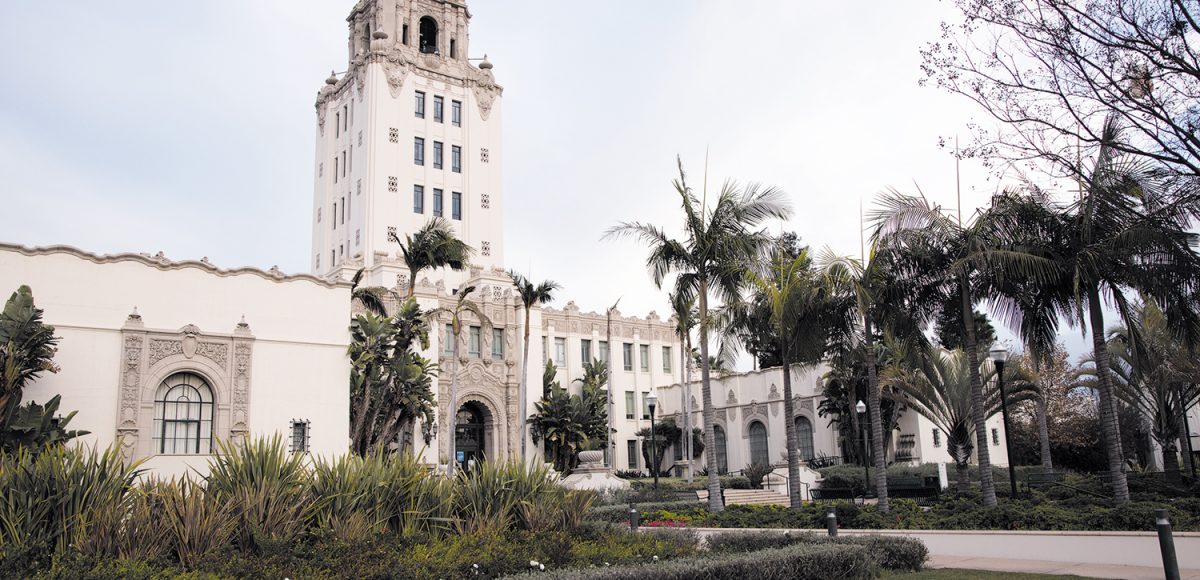In a May 21 Study Session meeting, City Council members voiced their support for the proposed Fiscal Year 2024 to 2025 budget, while also discussing the need to prepare Beverly Hills to meet the financial challenges of the future.
Beverly Hills’ immediate financial forecast is sunny, allowing staff to present a balanced $643 million budget that includes additional funding for police officers, the Public Works Department and capital improvement projects. But fiscal rain clouds loom on the horizon and city expenditures are projected to exceed revenues in future budget cycles.
All five council members said they were comfortable with the proposed FY 2024 to 2025 budget —which is expected to return before the council in a June 18 formal meeting—and agreed it will be essential to develop new cost saving and revenue-raising measures going forward.
“We are Beverly Hills and there’s a level of service that is expected not only in police and fire, but also in community services,” said Mayor Lester Friedman. “I think that we need to be cognizant of being able to meet those expectations and the reality that we need to have the money to spend on it. I think it’s going to be a balance that we’re going to be looking at throughout this year.”
City staff proposes 24 enhancements to this year’s budget, totaling $14.4 million. Of this, $7.7 million will go to the Police Department, $5 million to private security and $2.4 million to the Public Works department.
The BHPD plans to hire seven new police officers and one police sergeant to address public safety needs around the upcoming metro station and supportive homeless housing in Beverly Hills.
Station 1 of the Metro Purple Line Extension at La Cienega Boulevard and Wilshire Boulevard is expected to open in the spring of 2025. Beverly Hills also intends to provide 30 units of permanent supportive housing for the chronically homeless through a partnership with Step Up on Second.
The private security funding will be used to assist police officers and provide patrols in residential and retail areas. Meanwhile, Public Works intends to use its increased funding for sustainability initiatives as well as the maintenance of city infrastructure and facilities.
“I am comfortable with this budget, including the enhancements with regard to public safety and I’m certain that everyone can see that as a priority here especially when it comes to Metro,” said Councilmember Mary Wells. “I’m also very happy to see we are having enhancements around our community services in the parks as well as electrical resilience and for our water sustainability.”
The budget also includes $85.6 million for capital improvements, including projects for water infrastructure; street, sidewalk and traffic safety; facilities and parks; vehicle fleet expansion; and technology enhancements to improve public safety.
Other budget increases are due to the growing costs. This includes a $4.5 million increase for staff salaries and benefits, a $3.0 million increase in liability funds to accommodate current and anticipated claims activity and a $1.4 million increase in insurance costs.
Fortunately, all of the city’s “big four” revenue streams have rebounded to pre-pandemic levels. This includes sales tax, business license tax, transient occupancy (aka hotel) tax and property tax.
However, part of the reason why the city can balance the budget this year is due to one-time funds from development agreements and public benefit contributions—money it will not be able to rely on in future budget cycles.
“I have real concerns about the forecast going forward in the future and how we’re going to find cost cutting,” said Councilmember Craig Corman, noting that the loss of the Cheval Blanc project was a harsh blow to the city’s future finances.
While Corman is hopeful about the possibility of increasing revenue through taxes, he noted that this “is not a done deal” and will require support from the city’s voters.
In determining new strategies to strengthen the city’s finances, the council will be working from recommendations made by the Blue-Ribbon Committee on Long-Term Strategic Financial Planning, an initiative started by former Mayor Dr. Julian Gold.
On April 18, the committee presented 10 potential strategies for raising revenues to the City Council. These include hikes to the transient occupancy tax and sales tax; expedited real estate leases on city-owned properties; increasing city parking fees; and reforming the project planning and permitting processes to make it easier for businesses to operate in Beverly Hills.







